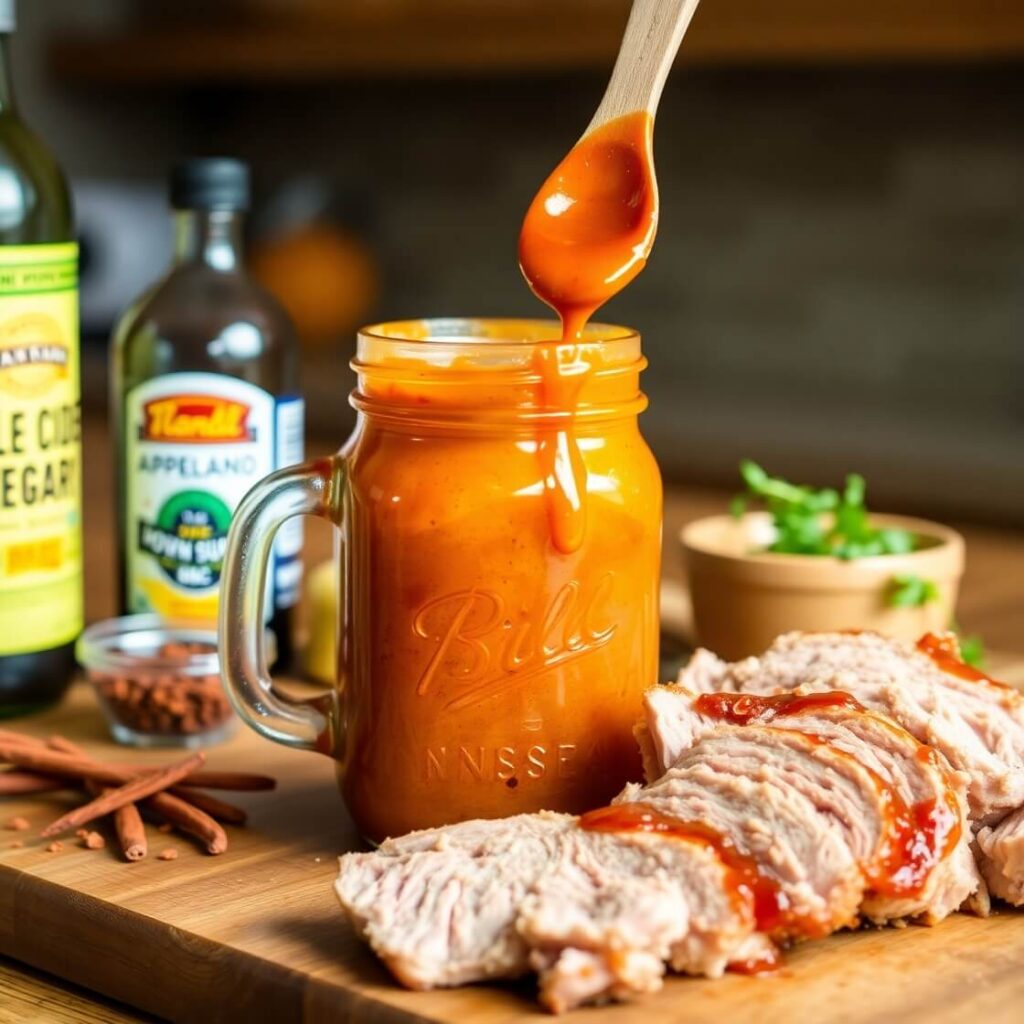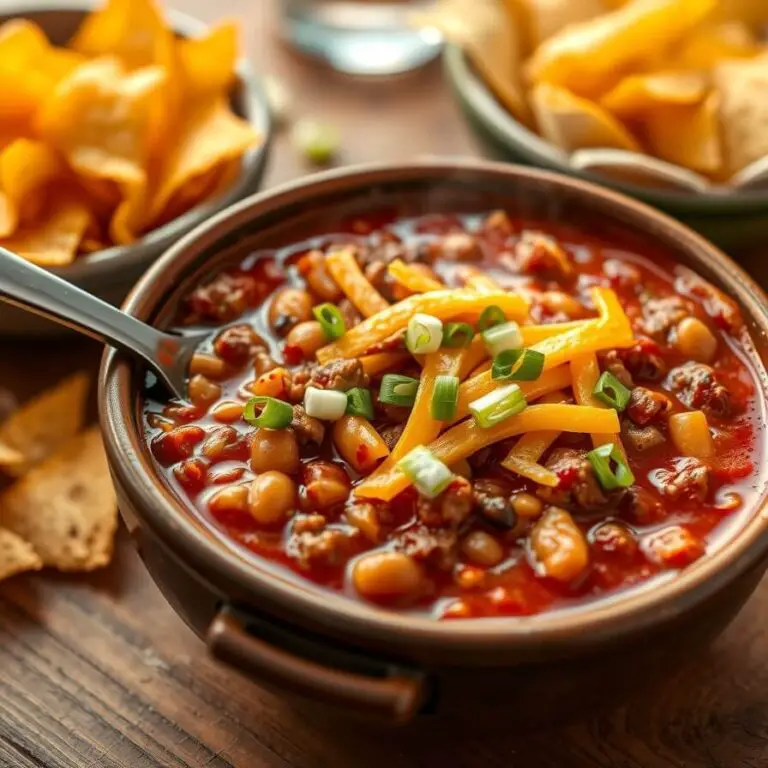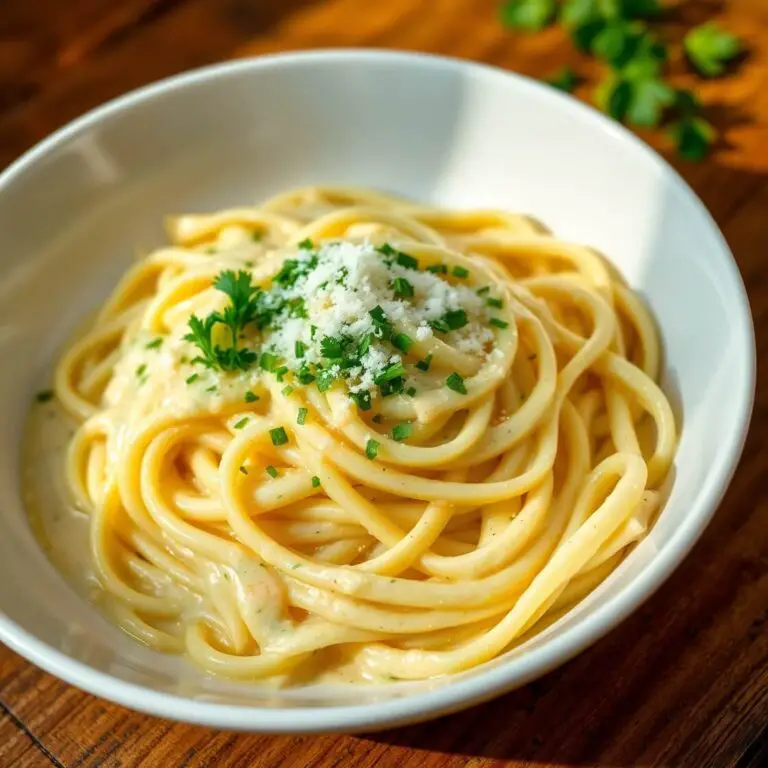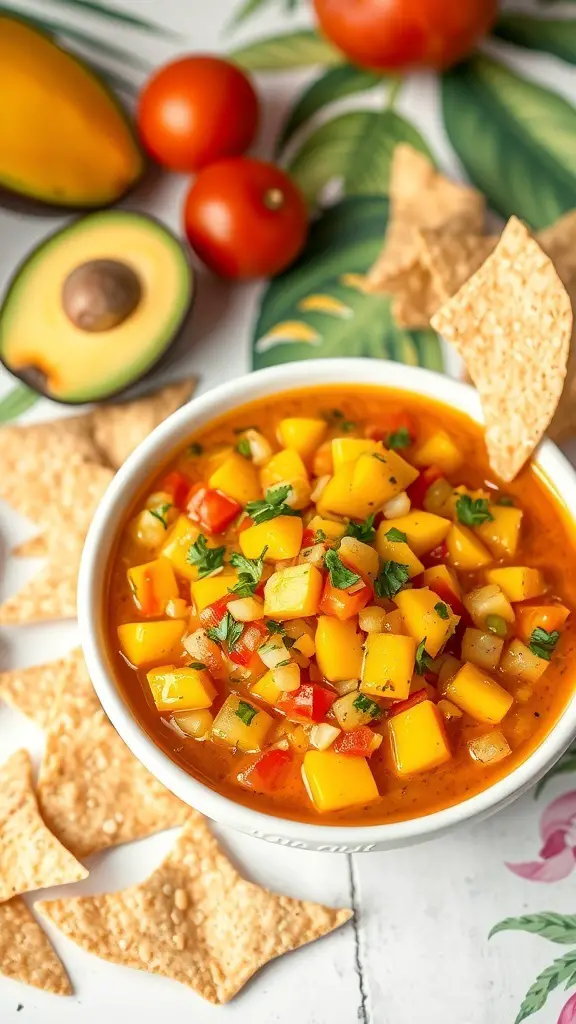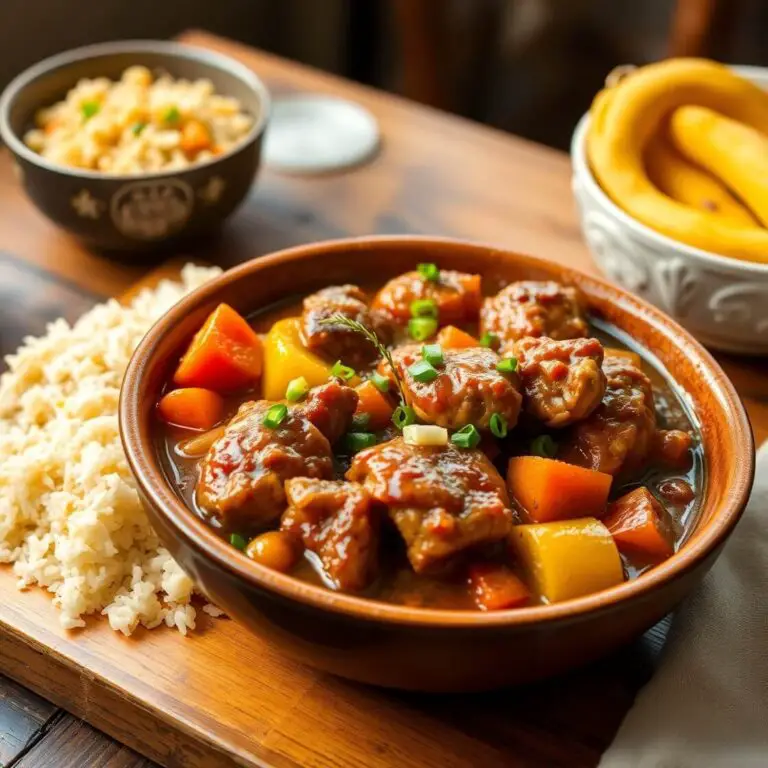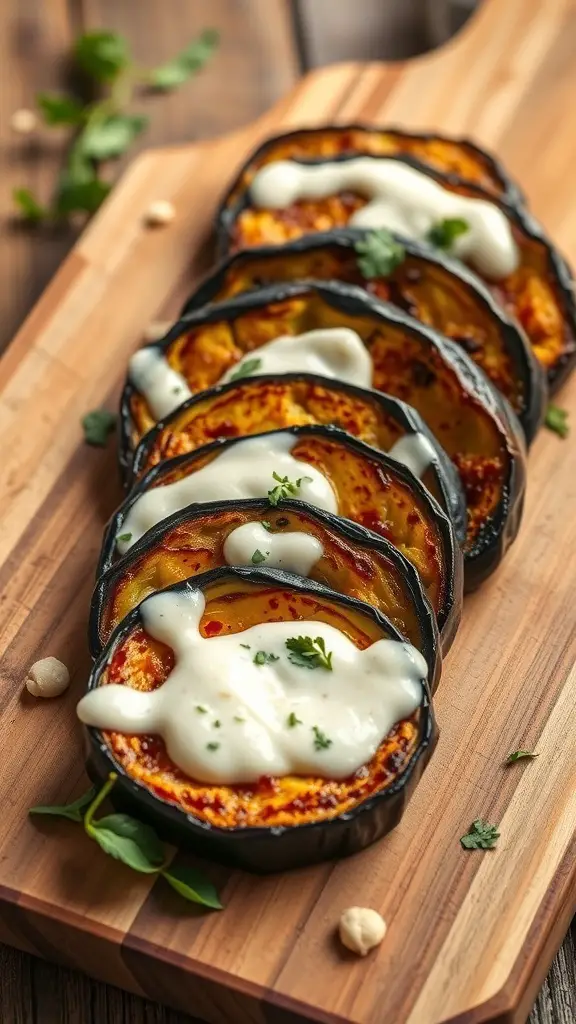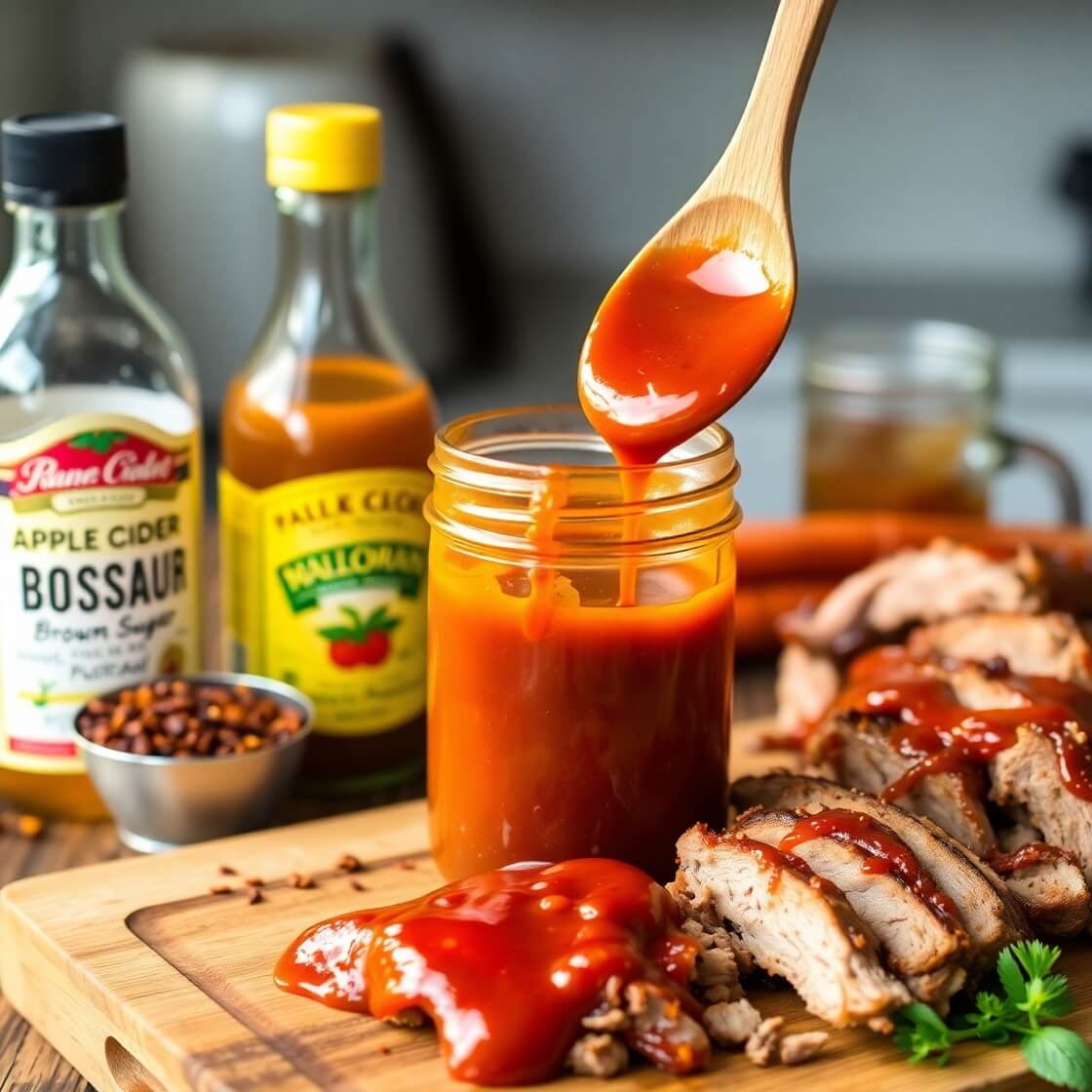
When I first tasted Carolina BBQ sauce at a roadside smokehouse on a road trip through North Carolina, I was hooked. Unlike the thick, sweet tomato-based sauces common in other parts of the country, this version had a tangy, spicy kick that clung perfectly to pulled pork and grilled chicken. It was bold, vibrant, and completely unforgettable.
That experience stuck with me for years, and eventually, I decided to recreate it at home. The result? A homemade Carolina BBQ sauce that’s become a staple in our kitchen and a go-to whenever barbecue season rolls around.
If you’re tired of overly sweet sauces and are looking for something with real depth, zing, and that signature vinegar punch, this is the one to bookmark. Keep reading—you’re about to unlock a game-changing BBQ secret from the South.
Why I Love This Recipe
Let’s be honest—BBQ sauce can make or break your whole meal. I used to rely on store-bought options, thinking they’d deliver that smoky, satisfying finish I craved. But once I tasted a true Carolina-style vinegar-based BBQ sauce, I realized I’d been missing out on something extraordinary.
What makes this sauce special is its simplicity and bold flavor. There’s no ketchup overload here—just a balanced blend of apple cider vinegar, brown sugar, mustard, and a touch of heat from red pepper flakes. It cuts through fatty meats like pulled pork and brisket beautifully, without overpowering them.
Plus, this isn’t just a sauce—it’s a tradition. It’s part of Southern heritage, born in smoke pits and passed down through generations. Making it from scratch brings that authenticity into your own kitchen. Whether you’re grilling, roasting, or even slow-cooking, this Carolina BBQ sauce elevates everything it touches.
Ingredients for Carolina BBQ Sauce
If you’re expecting a long grocery list, you’ll be pleasantly surprised. This sauce doesn’t rely on fancy ingredients—just a few pantry staples that, when combined, deliver flavor that’s far from ordinary.
Before you begin, grab a medium saucepan and let’s build the base of this iconic sauce together. Here’s what you’ll need and why each ingredient matters:
- Apple Cider Vinegar – This is the heart of Carolina BBQ sauce. It gives the sauce its tangy backbone and helps tenderize meat if used as a mop sauce.
- Brown Sugar – To balance the acidity, we add just enough sweetness to mellow the sharpness of the vinegar and add a rich caramel undertone.
- Yellow Mustard – A staple in many Carolina recipes, yellow mustard adds sharpness, depth, and a golden hue.
- Ketchup – Just a touch to round out the flavor and give it body, but it’s not the star here.
- Worcestershire Sauce – Adds umami and complexity that brings everything together.
- Red Pepper Flakes – For a subtle heat that lingers and makes the sauce memorable.
- Salt & Black Pepper – Basic seasonings that enhance and balance every flavor.
You can adjust these ingredients depending on your preference—more heat, less sweet, or even a smokier version. But starting with this base will give you a classic Carolina flavor that’s loved throughout the South.
How Much Time Will You Need
This is one of the easiest sauces you’ll ever make. There’s no marinating, no babysitting a smoker, and no complicated equipment needed.
- Prep time: 5 minutes
- Cook time: 15–20 minutes
- Total time: Under 30 minutes
It’s the perfect last-minute sauce when you want big flavor without spending hours in the kitchen.
How to Make This Carolina BBQ Sauce
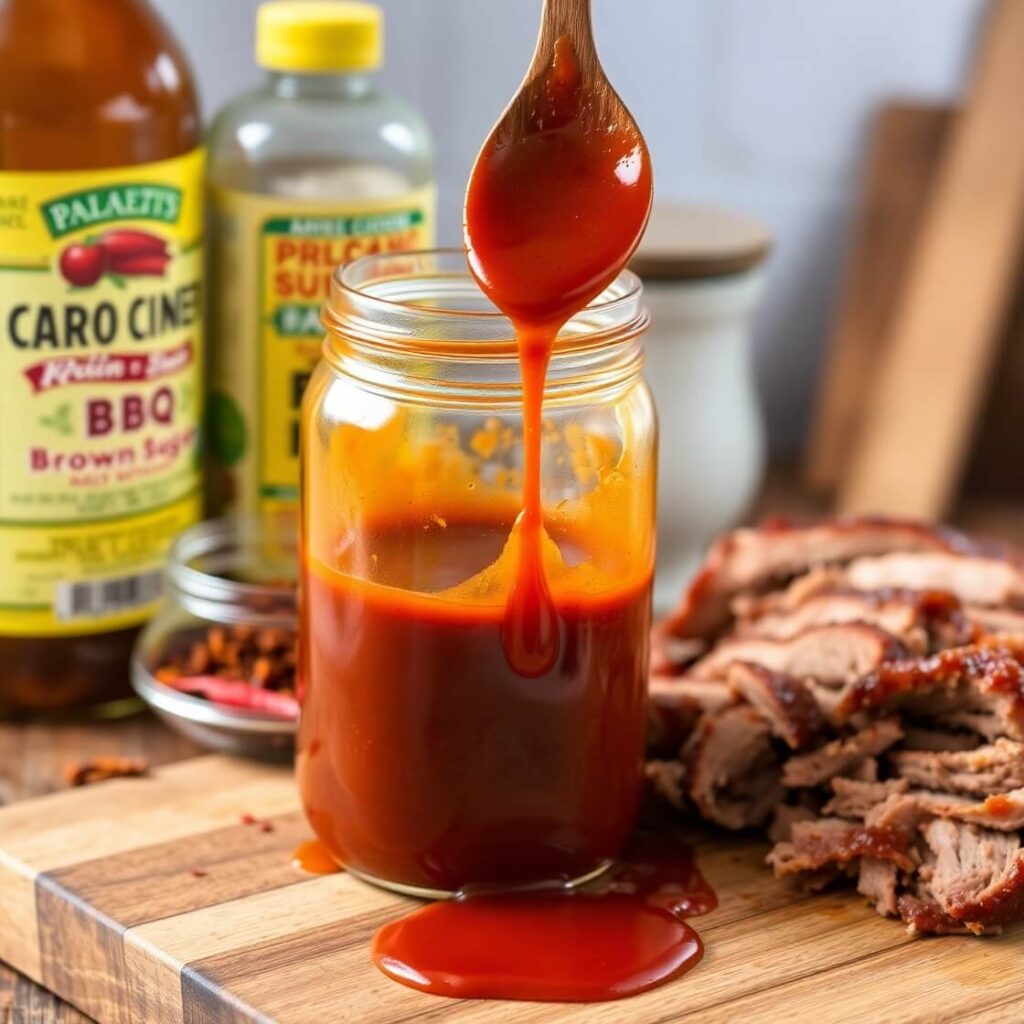
Ready to bring Southern charm to your table? Let’s get cooking.
Step – 1: Combine Ingredients in a Saucepan
In a medium saucepan, pour in 1 cup of apple cider vinegar, ½ cup of brown sugar, ¼ cup of yellow mustard, 2 tablespoons of ketchup, 1 tablespoon Worcestershire sauce, ½ teaspoon of crushed red pepper flakes, ½ teaspoon of salt, and ¼ teaspoon of black pepper.
Whisk everything together until the mixture is smooth and well-blended.
Step – 2: Simmer Gently
Place the saucepan over medium heat and bring the mixture to a gentle simmer, stirring occasionally. Don’t rush this part—you want the flavors to melt together slowly.
Let it simmer uncovered for 15–20 minutes, stirring occasionally. You’ll notice the sauce will thicken just slightly, and the vinegar will mellow out as it cooks.
Step – 3: Taste and Adjust
Turn off the heat and taste the sauce. Want more heat? Add a pinch more red pepper. Need it sweeter? Stir in a bit more brown sugar. Customize to your liking, but keep the signature tang front and center.
Step – 4: Cool and Store
Let the sauce cool for 10–15 minutes before pouring it into a clean glass jar or squeeze bottle. It will continue to develop flavor as it sits. Refrigerate once cooled.
Substitutions
Not everyone has the exact ingredients on hand, and that’s okay. Here’s how you can make a few swaps without sacrificing flavor.
No Apple Cider Vinegar?
Use white vinegar or rice vinegar as a backup. Just know it’ll slightly change the taste—white vinegar is sharper, rice vinegar is milder.
No Yellow Mustard?
Swap in Dijon for a bit of elegance or spicy brown mustard for more bite. Avoid honey mustard, which adds unintended sweetness.
No Brown Sugar?
White sugar works, though you’ll lose some of the molasses depth. Try honey or maple syrup for a natural twist.
Want it Smokier?
Add a dash of liquid smoke or smoked paprika.
Low Sodium?
Cut back on salt and Worcestershire or use a low-sodium version.
This sauce is very forgiving, so feel free to experiment a bit to suit your pantry and your palate.
Best Side Dishes for Carolina BBQ Sauce
Pairing this bold sauce with the right side dishes turns a good meal into a great one. Here are three tried-and-true favorites:
1. Creamy Coleslaw
A cool, creamy slaw with shredded cabbage and carrots is the perfect crunchy counterpoint to tangy BBQ.
2. Cornbread
Soft, sweet cornbread soaks up every last drop of sauce and gives your plate a comforting Southern touch.
3. Grilled Corn on the Cob
Charred and buttery corn brings out the smokiness in BBQ and adds a juicy burst with every bite.
Serving and Presentation Tips
Once you’ve made this sauce, don’t just slather it on and call it a day—presentation matters, even for BBQ. The right serving approach elevates the experience and adds a touch of charm to your table.
Here’s how I love to serve it:
Use a Glass Jar or Pour Bottle
A clear mason jar or glass squeeze bottle showcases the rich amber color of the sauce and adds rustic appeal—perfect for casual backyard BBQs or family dinners.
Serve Warm or at Room Temperature
Cold sauce can dull the flavor. Warm your Carolina BBQ sauce slightly before serving, especially if pairing with hot grilled meats.
Offer a Side Bowl for Dipping
Besides brushing it onto pulled pork or chicken, serve a little extra on the side. It’s perfect for guests who want an extra tangy punch without over-saucing their plate.
Brush It On at the Right Time
If you’re using this on the grill, brush it on during the last 5–10 minutes of cooking. That prevents burning and allows the flavor to set without overpowering the meat.
Tips and Tricks to Make This Recipe Even Better
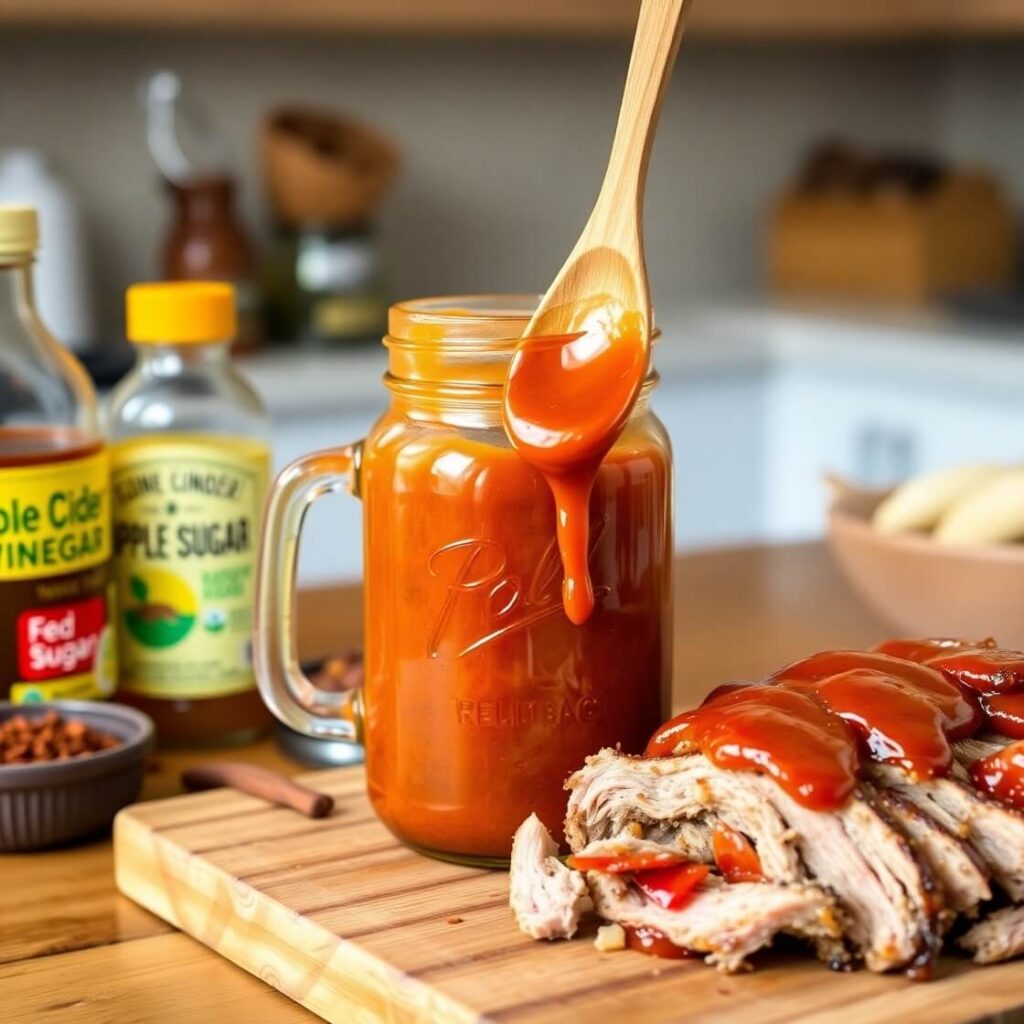
This sauce is already delicious, but a few small tweaks can take it to the next level.
Simmer Longer for Depth
The longer you simmer, the more complex the flavor becomes. If you have time, let it cook low and slow for up to 30 minutes.
Let It Rest Overnight
Like many sauces, this one gets better with time. Make it a day ahead and refrigerate it—the flavors will mellow and deepen beautifully.
Double the Batch and Freeze
This sauce freezes well in small portions. I like to use ice cube trays to freeze individual servings, so I can grab just what I need later.
Add a Touch of Butter for Shine
If you want to brush the sauce onto meats right before serving, stir in a tablespoon of butter—it gives the sauce a lovely sheen and richer mouthfeel.
Use It as a Marinade
Thin it out slightly with water or broth and use it to marinate pork chops, chicken thighs, or even tofu.
Common Mistakes to Avoid
Even though it’s simple to make, there are a few pitfalls that can throw off the balance.
Using Too Much Sugar
Carolina BBQ sauce is supposed to be tangy, not syrupy. Too much sugar drowns the vinegar flavor and turns it into something else entirely.
Skipping the Simmer
Some recipes call for a no-cook version, but trust me—cooking the sauce is crucial. It helps the flavors meld and smooths out the vinegar bite.
Overcooking or Boiling Hard
You want a gentle simmer, not a rolling boil. Boiling too hard can make the vinegar too sharp and reduce the sauce too much.
Adding the Sauce Too Early on the Grill
Because it’s vinegar-based, this sauce can evaporate quickly or burn. Wait until the end of cooking to brush it on your meat.
Not Tasting and Adjusting
Your vinegar might be sharper than mine. Your mustard may be tangier. Always taste the sauce before serving, and don’t be afraid to tweak the sugar, salt, or pepper.
How to Store It
This sauce is just as easy to store as it is to make.
In the Refrigerator
Pour the cooled sauce into a clean, airtight glass jar or container. It will last up to 2 weeks in the fridge. Always use a clean spoon when dipping in to avoid contamination.
In the Freezer
Yes, you can freeze BBQ sauce! Pour it into freezer-safe bags or containers. It keeps well for up to 3 months. Let it thaw in the fridge overnight before using.
Shake or Stir Before Serving
Because it’s vinegar-based, it may separate slightly over time. Just give it a good stir or shake before using again.
FAQ
What meat pairs best with Carolina BBQ sauce?
It’s absolutely perfect for pulled pork, but it also shines on grilled chicken, ribs, smoked turkey, and even as a finishing drizzle on brisket.
Can I make it less spicy?
Yes! Just reduce or omit the red pepper flakes. You can always serve some extra on the side for those who like heat.
Is this sauce gluten-free?
Yes—as long as your Worcestershire sauce is gluten-free. Some brands contain malt vinegar, so double-check the label.
Can I use it as a salad dressing?
Surprisingly, yes! It makes a zippy dressing for coleslaw or a drizzle for a grilled chicken salad.
How can I thicken the sauce?
This style of sauce is traditionally thin, but if you prefer it thicker, simmer it a bit longer or stir in ½ teaspoon of cornstarch mixed with a splash of water at the end.
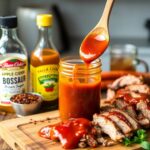
Carolina BBQ Sauce Recipe
- Total Time: 25 minutes
- Yield: 1½ 1x
- Diet: Gluten Free
Description
This homemade Carolina BBQ sauce is tangy, zesty, and full of Southern character. With its vinegar-forward bite, just the right touch of sweetness, and a hint of mustard and spice, it’s the perfect companion to pulled pork, grilled chicken, and all your summer BBQ favorites. Ready in under 30 minutes, it’s a bold and easy sauce that brings the smoky charm of the Carolinas straight to your kitchen. It stores beautifully and tastes even better the next day—so don’t hesitate to make a double batch.
Ingredients
- 1 cup apple cider vinegar
- ½ cup packed brown sugar
- ¼ cup yellow mustard
- 2 tablespoons ketchup
- 1 tablespoon Worcestershire sauce
- ½ teaspoon crushed red pepper flakes
- ½ teaspoon kosher salt
- ¼ teaspoon ground black pepper
Instructions
- Combine all ingredients in a medium saucepan. Whisk until well mixed.
- Place over medium heat and bring to a gentle simmer.
- Simmer uncovered for 15–20 minutes, stirring occasionally.
- Taste and adjust seasoning if needed (more sugar for sweetness, more pepper for heat).
- Let the sauce cool, then pour into a jar or bottle.
- Store in the refrigerator for up to 2 weeks.
Notes
- The sauce gets better as it sits—make it a day ahead if possible.
- Warm before serving to enhance flavor.
- Use it as a mop sauce, marinade, or finishing drizzle.
- Prep Time: 5 minutes
- Cook Time: 20 minutes
- Category: Sauce
- Method: Simmering
- Cuisine: Southern American
Nutrition
- Serving Size: 1½
- Calories: 45
- Sugar: 7g
- Sodium: 180mg
- Fat: 0g
- Saturated Fat: 0g
- Unsaturated Fat: 0g
- Trans Fat: 0g
- Carbohydrates: 10g
- Fiber: 0g
- Protein: 0g
- Cholesterol: 0mg

